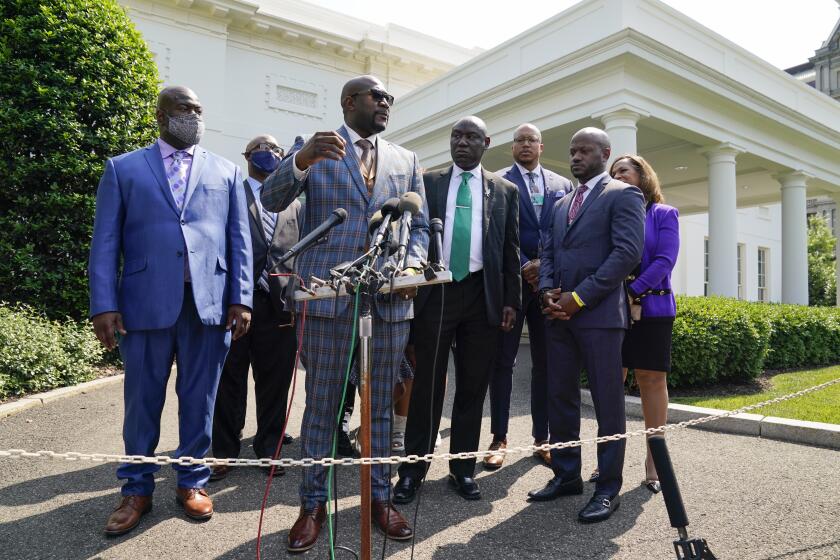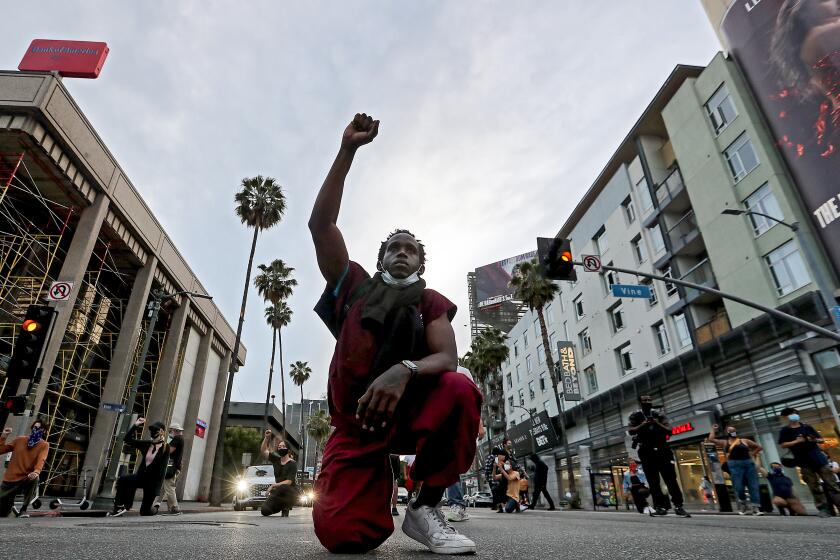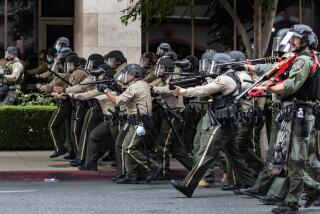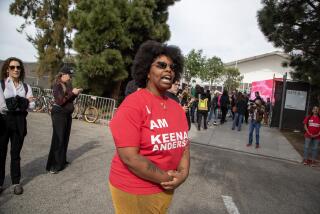Even supposedly liberal California hasn’t changed in the year since George Floyd
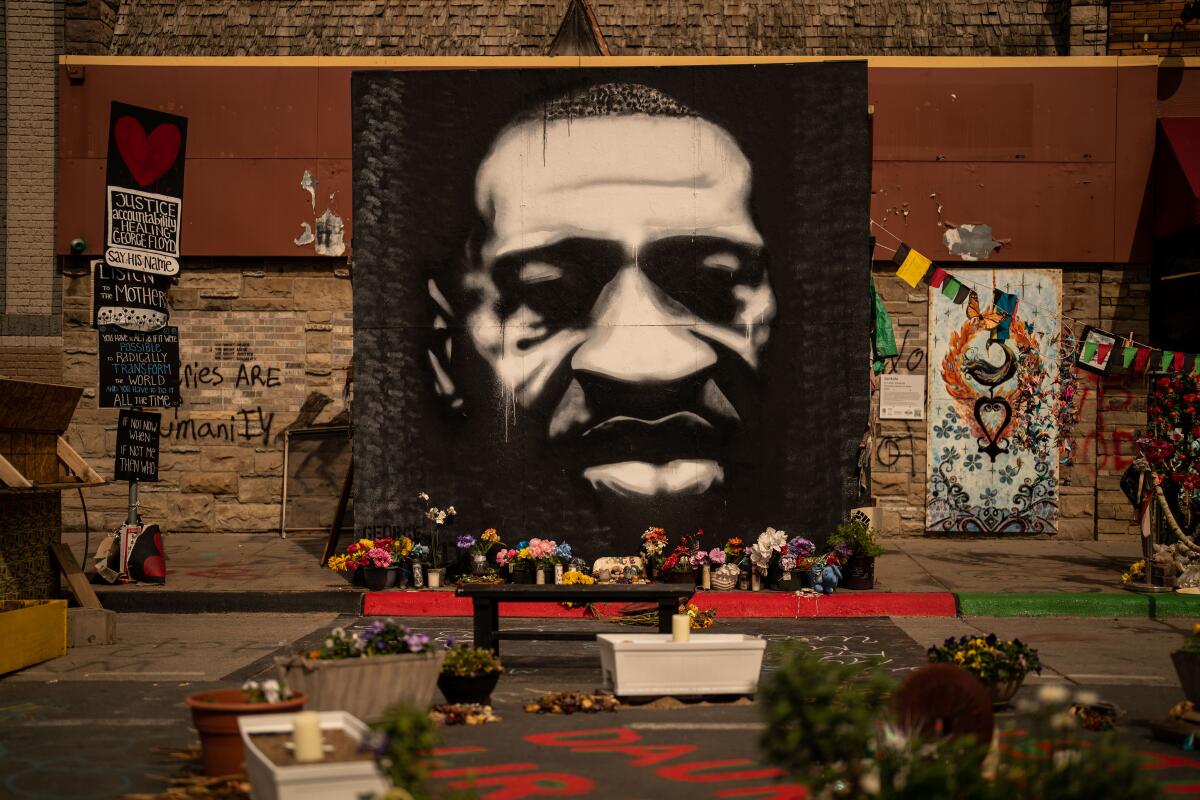
- Share via
At the first event of the day to mourn — well, fume — over the murder of George Floyd by Minneapolis police, activist Paula Minor climbed up on the back of a flatbed truck across from L.A. City Hall and shouted the obvious.
“Changes were promised. A lot of things were said. A lot of things began,” she said, prompting nods from a few dozen protesters blocking 1st Street on Tuesday morning. “But here in Los Angeles, city and county, change did not occur.”
She’s right. Police are still killing Black and Latino people at disproportionate rates, as Californians were reminded last week by Floyd’s younger brother, Philonise, who flew to Southern California to stand with the family of yet another Black man killed by the cops.
“The world needs to stand up for Anthony McClain just like they did for George Floyd,” Philonise told protesters assembled outside Pasadena City Hall.
McClain, 32, was shot in the back last August while trying to flee a traffic stop. The case has received fresh attention after the family’s attorney, Ben Crump — also an attorney for the Floyd family — recently released new video of his last moments.
“We need to push the issue every day because, every day, it’s somebody being killed,” Philonise continued, shouting now in his thick Southern drawl: “It’s like a never-ending cycle!”
Indeed, in the year since former officer and convicted murderer Derek Chauvin held his knee on George Floyd’s neck until he stopped breathing, police have killed roughly 1,100 Americans, according to the research collaborative Mapping Police Violence.
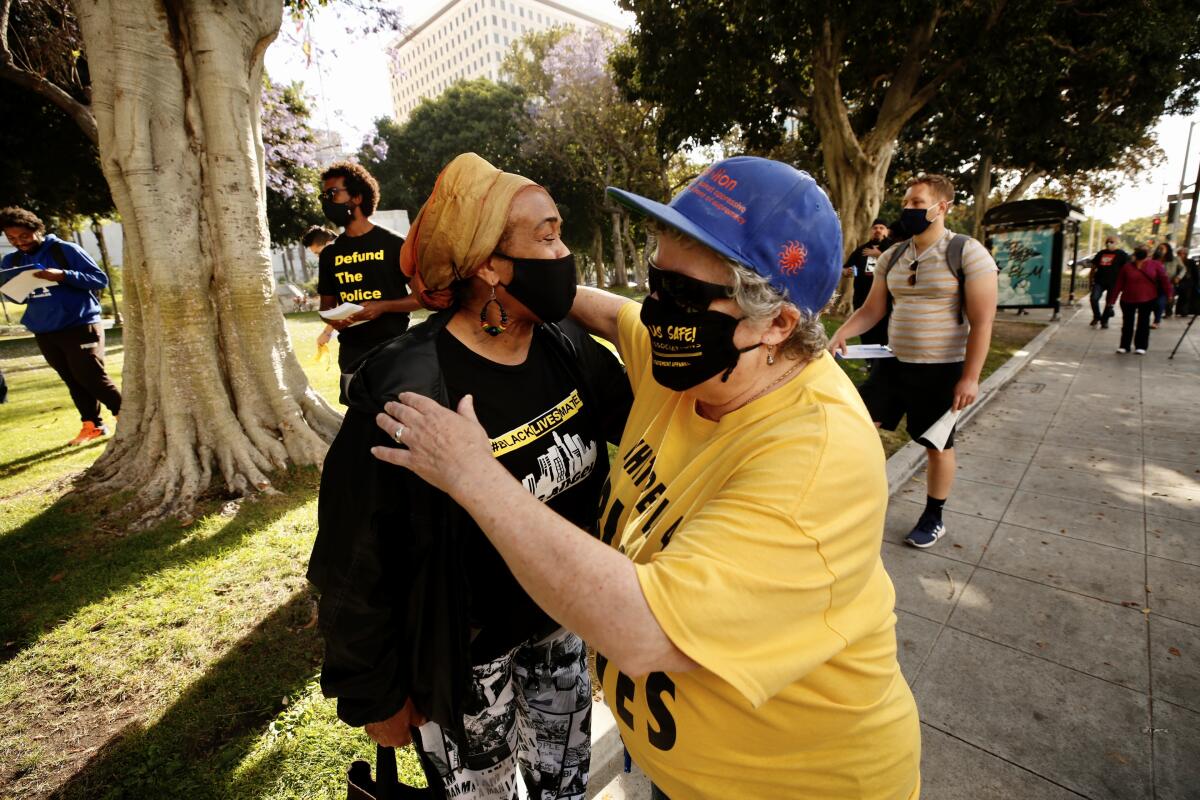
It’s a pace that, somehow, has remained remarkably and horrifically consistent with the death toll of previous years despite all the protests and the months of stay-at-home orders prompted by the COVID-19 pandemic.
Since January, police have already killed more than 400 people, including 60 in California.
It is hard to achieve true change in this country, steeped as it is in disparities and inequities.
Such statistics are sobering, particularly for the newly woke set who took to the streets last summer, drunk on power about rooting out systemic racism from all of its institutional hiding places. And particularly for those in overwhelmingly liberal California.
In my first column for The Times last year, published not long after Santa Monica police had unleashed clouds of tear gas on Black Lives Matter protesters, I wrote that our state isn’t nearly as enlightened or progressive about racial justice as many Californians would like to believe.
Get the latest from Erika D. Smith
Commentary on people, politics and the quest for a more equitable California.
You may occasionally receive promotional content from the Los Angeles Times.
I have seen little to change my mind. But I do believe a newfound awareness about just how unenlightened we really are has taken root since George Floyd was killed, and that has put California on a potentially more just path.
For example, I wrote about the man who, during those first chaotic days of last summer’s protests, drove his Jeep Wrangler — its “Keep America Great” flag waving proudly — through a Black Lives Matter rally in Visalia.
Luckily, no one was seriously injured. But one would think such an act would result in criminal charges, right? Nope.
It took a few weeks, but the Tulare County District Attorney’s Office announced that it wouldn’t prosecute because it couldn’t prove beyond a reasonable doubt that the driver wasn’t acting in self-defense. Because pedestrians pose such a threat to a Jeep, which is designed to drive over boulders?
“The vehicle was being operated lawfully upon a public roadway and was sitting in traffic...,” prosecutors explained in a news release. “Multiple protesters entered the roadway on foot intentionally blocking the path of the vehicle.”
What’s surprising is that there were protests against this decision — in Visalia, sandwiched between the conservative Central Valley bastions of Fresno and Bakersfield. That’s something that I doubt would’ve happened before George Floyd.
President Biden met with George Floyd’s family Tuesday, but a year after Floyd’s death, little progress has been made on racial justice issues.
I also wrote about a Black man, later identified as Amaurie Johnson, who was falsely accused, accosted and arrested by a white officer named Matthew Dages at the Grossmont Transit Center in La Mesa.
A video of the encounter, recorded by a friend of Johnson’s who arrived just as Dages began his manhandling, went viral. That was on May 27, just a few days after Floyd’s murder, and rage over both cases merged into a conflagration of protests across San Diego County.
Dages was ultimately fired and charged with filing a false police report — two things that almost never happen.
If not for the video, “I would be charged right now. It would be my word versus his,” Johnson, 24, told the San Diego Union-Tribune earlier this month. “That’s pretty much the status quo with policing policies in America. Nobody holds [officers] accountable unless you force them to [with video evidence].”
He knows he fared better than Anthony McClain.
Or Andres Guardado, who also was shot in the back, but by Los Angeles County sheriff’s deputies in June of last year. Or Dijon Kizzee, who was chased down and killed by deputies in South L.A. a couple of months later.
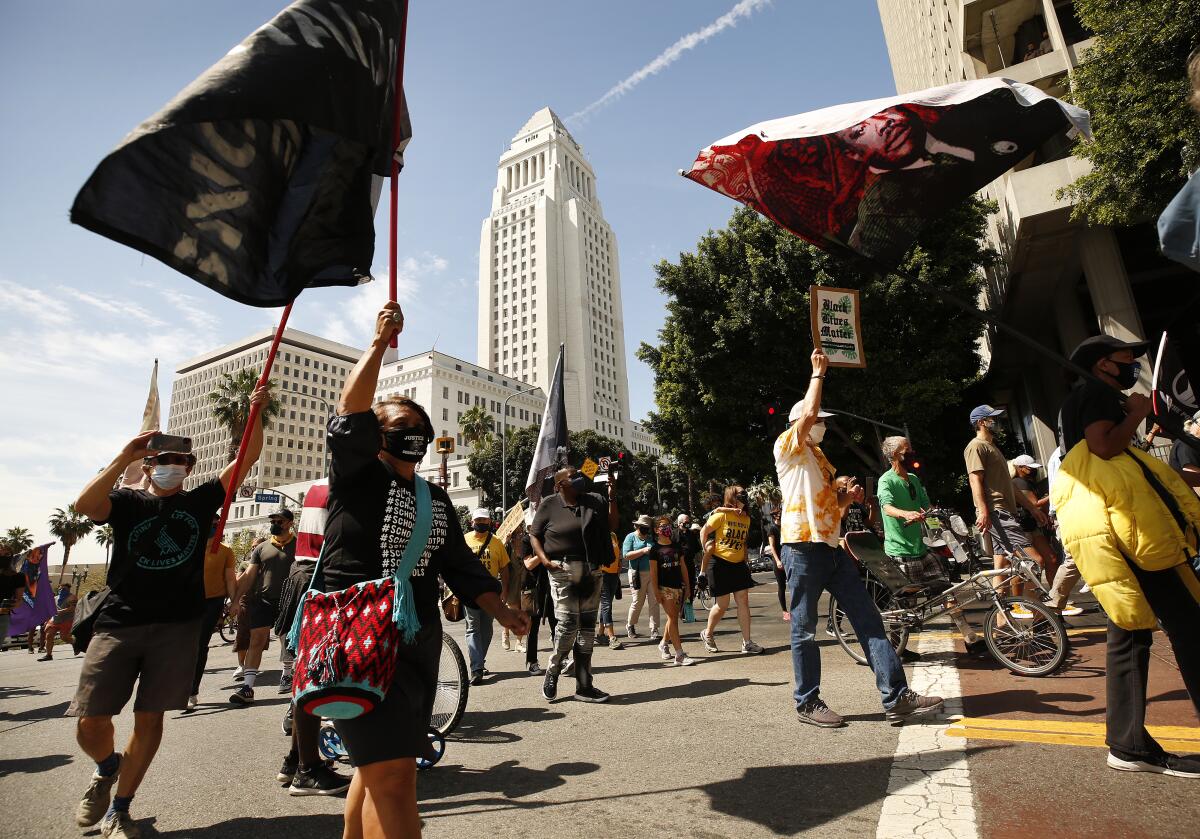
Meanwhile, elected officials in cities from Los Angeles to Fresno to Chico to Oakland have decided to increase spending for police departments — in one way or another — after whacking their budgets last summer under pressure from activists.
This year, there is the political fallout from rising homicide rates in many cities. That alone has been enough to prompt some politicians to cave.
But while some departments are already using their restored budgets to hire back officers, many cities have redirected some — though not nearly enough — funding to gang intervention and to mental health services, so that social workers can handle some emergency calls instead of police.
Other cities, including La Mesa and Sacramento, have revamped or created civilian oversight boards, and tweaked use-of-force and de-escalation policies.
And even Gov. Gavin Newsom’s proposed budget, flush as it is with surplus cash, is allocating funds to bolster social services to help alleviate the trauma in Black and Latino communities ravaged by the pandemic. Trauma, which is more likely behind the uptick in homicides than a lack of police officers.
Progress is often two steps forward, one step back. Whatever dream there was for a more direct route, buoyed by calls for a racial reckoning after we watched George Floyd die on a Minneapolis street, clearly hasn’t materialized.
A year later, most Americans think the protests didn’t make much difference in terms of policing or the systemic racism that’s embedded in society, according to a new poll from the Associated Press and the University of Chicago. This is true even though most Americans also support police reform and “major changes” to the criminal justice system.
A bill at the federal level named after George Floyd would enact many such reforms. But so far, it is stuck in the Senate, though President Biden continues to stump for it, as he did Tuesday after he and Vice President Kamala Harris met with members of the Floyd family.
Given all of this, it’s tempting to give up. But then I think of Philonise Floyd, who before his brother’s murder, was working as a truck driver. Today, he’s an activist — a job he didn’t ask for, but has accepted nonetheless, in that weighty way so many relatives of Black people killed by police end up doing.
The murder of George Floyd a year ago sparked protests nationwide. Angelenos gathered Tuesday to commemorate his life.
“We’ve got to march, and it can be peaceful, but we’ve got to show up,” he said in Pasadena last week. “That’s the only way we’ll get some type of accountability.”
And then I think about what Minor said on Tuesday morning, speaking to a crowd of protesters a fraction the size of those that took over downtown L.A. last summer.
“I’m going to start by calling some of the names of those who have been murdered since the murder of George Floyd. Before I do that, can we just take a moment of silence, take a moment of meditation,” she said. “Take a moment to think about why we’re here, what we’re going to do, what we can bring to the struggle, and how we can uplift what needs to be done and continue to make our demands.”
Minor paused, as her amplified voice echoed through the still mostly empty streets.
“So just take a moment of silence,” she said, “close your eyes, and then we’ll call the names.”
More to Read
Get the latest from Erika D. Smith
Commentary on people, politics and the quest for a more equitable California.
You may occasionally receive promotional content from the Los Angeles Times.
